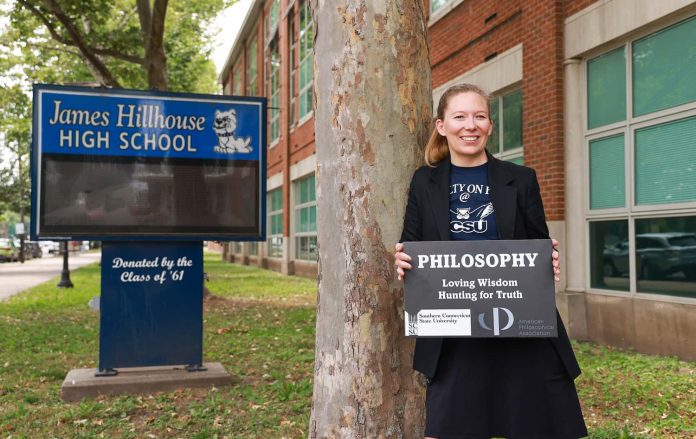Philosophy Department Assistant Chair Chelsea Harry is concerned about what she sees as a growing problem in higher education: disappearing arts and humanities departments, and greater problems associated with this, including reduced literacy rates and less critical thinking about social justice. And she is determined to solve this problem.
“When one is a philosopher,” Harry says, “one thinks [philosophy] is such an important thing to study, and so meaningful and important to human life and to the progress of our society. Why don’t students want to take the classes?”
In part to answer this question, Harry, whose specialties are ancient Greek philosophy and late 18-19th century German thought, founded Philosophy in the Schools New Haven, a community outreach project in public philosophy, which she also directs. Harry’s project has received grant funding from the American Philosophical Association (APA); she was awarded a Berry Fund Grant for Public Philosophy from the APA to continue the program.
What started in 2021 as a virtual program via Zoom during the pandemic has successfully moved to in-person education. Delivered as a special event at Hillhouse and High School in the Community, Philosophy in the Schools New Haven provides high schoolers the opportunity to engage in philosophical discussion that they might not otherwise have, as philosophy is not provided in the public school curriculum. At least 15 to 30 students attend the events every time they occur.
“People don’t know what philosophy means, and they don’t know what we actually do,” Harry says. So, what exactly is philosophy? The direct Greek translation of the word means “loving wisdom,” and according to Harry, one of the earliest Western definitions is “to hunt for truth.”
“It’s also been described as the thing that people are doing when they’re not looking for money or power — they’re just looking to know,” says Harry.
Why high school students? “In my experience working with the students in New Haven so far, philosophy is an easy sell,” Harry says. “They realize the intrinsic and extrinsic benefits of being able to critically think about everything that we’re doing. Because, well, we’ve all been teenagers. Teenagers love to critically think about, ‘Why are we doing it this way? Why can’t we do it this way?’ I think that’s something so valuable about young people that we sometimes lose sight of.”
While Harry is introducing teenagers to classic Greek philosophers such as Plato and Aristotle, she is also expanding philosophic thought to modern, relevant issues of social justice and intersectionality through the work of the late Black feminist writer bell hooks.
Through the lens of these thinkers, Harry can ask high schoolers big questions: “What is happiness, or normatively for everybody? What is a standard of living that’s acceptable? How should we treat nonhuman animals? How should we treat other humans? How should we engage in war? What are the things we should eat? What are the ways that we should live? What are the ways we should talk with each other?”
Harry hopes that Philosophy in the Schools New Haven will continue for a long time, and that its special events will inspire young philosophers to continue their journeys beyond high school. “I hope that’s part of a continued process, I hope that the students don’t see it as this occasional thing, but something that they’re learning how to do so they can do it on their own.”
She recalled one high school student’s response to the program: “I’ve never thought about anything so much in my whole life.”


